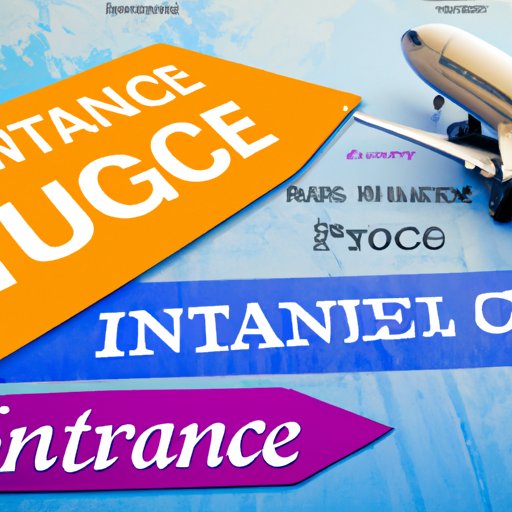Introduction
Travel insurance is a type of insurance designed to cover any losses that you may incur while traveling. It can provide coverage for medical expenses, trip cancellations, lost or delayed luggage, and more. While it’s not always necessary to purchase travel insurance, it can be beneficial in many situations.
Pros and Cons of Purchasing Travel Insurance
When considering whether or not to purchase travel insurance, it’s important to weigh the pros and cons. Here are some of the advantages and disadvantages of purchasing travel insurance:
Advantages
- Protection against unexpected events, such as flight cancellations or medical emergencies.
- Peace of mind knowing that you are covered in the event of an emergency.
- Financial protection against unexpected costs such as medical bills.
Disadvantages
- Additional cost that may not be necessary depending on your circumstances.
- Not all policies cover the same types of risks, so you may need to purchase additional coverage.

Cost Comparison of Travel Insurance Policies
The cost of travel insurance depends on the type of coverage you choose and the length of your trip. Some policies may cover a single trip, while others may cover multiple trips over the course of a year. When comparing policies, there are a few factors to consider:
Factors to Consider
- Coverage limits – How much coverage do you need?
- Type of coverage – What types of risks does the policy cover?
- Length of trip – Will the policy cover a one-time trip or multiple trips?
- Destination – Does the policy cover international travel?
Different Types of Coverage
Travel insurance policies typically offer three main types of coverage: medical, trip cancellation, and lost or delayed luggage. Medical coverage covers any medical expenses incurred while traveling, such as doctor visits or hospital stays. Trip cancellation coverage reimburses you if you have to cancel your trip due to unforeseen circumstances. Lost or delayed luggage coverage provides compensation if your luggage is lost or delayed while in transit.

Determining if You Need Travel Insurance for Your Trip
When deciding if you need travel insurance, it’s important to consider your individual circumstances. Here are a few things to keep in mind when determining if you need travel insurance:
Consider Your Circumstances
First, consider the type of trip you’re taking and what risks you may face. For example, if you’re planning a long international trip, you may want to purchase travel insurance to protect against unexpected medical expenses or trip cancellations. On the other hand, if you’re taking a short domestic trip, you may not need to purchase additional coverage.
Review Your Existing Coverage
It’s also important to review any existing coverage you may have. For example, many credit cards offer travel insurance as a benefit, so you may already have coverage without having to purchase additional insurance. Additionally, many health insurance policies cover medical expenses incurred while traveling, so you may not need to purchase medical coverage.
Analyze Your Budget
Finally, it’s important to analyze your budget to determine if you can afford to purchase travel insurance. Travel insurance policies vary in cost, and you may be able to find a policy that fits your budget. However, if you’re already stretched thin financially, you may want to skip the additional expense.
Common Travel Insurance Scenarios
Here are some common scenarios where travel insurance can be beneficial:
Lost or Delayed Luggage
If your luggage is lost or delayed while traveling, travel insurance can provide reimbursement for any items that were lost. This can help you replace essential items without breaking the bank.
Flight Cancellations
If your flight is cancelled due to weather or mechanical issues, travel insurance can provide reimbursement for any non-refundable expenses, such as a hotel or rental car. This can help reduce the financial burden of an unexpected change in plans.
Medical Emergencies
If you become ill or injured while traveling, travel insurance can provide coverage for medical expenses. This can help alleviate the worry of unexpected medical bills while traveling abroad.
Trip Cancellations
If you have to cancel your trip due to unforeseen circumstances, travel insurance can provide reimbursement for any non-refundable expenses. This can help make up for some of the financial losses associated with cancelling a trip.
Conclusion
Travel insurance can be a valuable tool when traveling, but it’s important to consider your individual circumstances before deciding if you need it. Evaluate your budget, review any existing coverage you may have, and consider the type of trip you’re taking to determine if travel insurance is right for you.
(Note: Is this article not meeting your expectations? Do you have knowledge or insights to share? Unlock new opportunities and expand your reach by joining our authors team. Click Registration to join us and share your expertise with our readers.)
